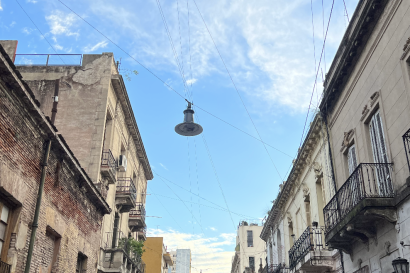I feel like I have talked about settling in and finding my groove here in Buenos Aires, but I’d like to give you a look at what an average day looks like for me. Although I do like to add some variety and keep my schedule open, this is a typical weekday in Buenos Aires:
9:00: My alarm goes off, I roll myself out of bed, splash some water on my face, and join my roommate Hanna for breakfast in the dining room
9:15-9:45: Eat a spread of breakfast goods—toast, corn flakes, yogurt, fruit, and tea. Hanna and I had mentioned typical breakfast foods we on the first day and, now, we eat these five things every morning.

(Our daily breakfast spread)
9:45-10:30: Get ready for school
10:30-11:00: Luckily, I do not have to take the bus to school and literally only walk down one street. It’s one of my favorite parts of the day (if I’m not walking behind a group of old women), though crossing Avenida 9 de Julio takes about 10 minutes every time.

(9 de Julio, the widest avenue in the world)
11:00-5:00/6:00: I spend a large chunk of my day at the IES Abroad Center. Classes at IES Abroad (and more generally outside the United States) are often a lot longer than those at my home university. I will have a class for two hours, a break for lunch, and then another three-hour class. I often stick around IES Abroad chatting and using the speedy WiFi, leaving the building around sunset.
6:10: Stop at the “postres” window outside of McDonald’s a grab a 15 peso (one dollar) ice cream cone
6:30-8:30: Decompress from the day by reading a book, watch an episode of something on Netflix, and start my homework.
8:30-9:30: Sit down for dinner with my host family—what we eat ranges quite a bit, though my favorite meal thus far has been a chickpea-based soup that warmed my whole body
9:30-12:30: These hours vary day to day. Sometimes I go out with friends, sometimes I sit at home and watch a movie, and other times I am completely exhausted and fall asleep.
While it may not be the most exciting day, this is the reality of living abroad—and this schedule has really given me the sense that I am LIVING abroad not just visiting.
_____________________________________
Now, as I have been living here for the past two months, I feel that I have some knowledge to impart. If you are interested in coming to Buenos Aires (whether for school, travel, or any other reason), I have provided a few tips that I would have love to known before coming here:
-
Inflation is real
Before coming to Argentina, I had heard about the economic problems and its tradition of inflation but experiencing it is something completely different. Within a couple short months, inflation has already risen causing goods and services to become more expensive. With prices already comparable to the U.S., this rise in prices can be a real blow to the wallet.
-
You are not near a beach
Now for someone that may be more geographically knowledgeable than I, this fact may not come as a shock. However, looking at a map of Buenos Aires and knowing that this city is a port for importing and exporting, I had convinced myself that I would be residing on the Atlantic Ocean…wrong! The river is something that you do not want to step into and the nearest beach is about four hours away.
-
People dress just as well as those in the States
I do not know how many blogs I read that said that same exact thing: Portenos are stylish people, so you must up your wardrobe game. However, upon my arrival I discovered that Crocs and fanny packs are commonly owned by many Portenos. Most people put in effort before stepping outside, of course, but this is not any different from what I have found in any other U.S. city.

Elizabeth Azevedo
<p>Come one, come all on this adventure of a lifetime! I'm Elizabeth, known to many as Liz and Avocado by some. Originally from Northern California, I am currently studying Communication Studies and American Culture at the University of Michigan - Ann Arbor. I've decided to take my education beyond the bounds of the United States and head to Buenos Aires, Argentina!! Follow me along this journey as I navigate a new country and try to remember Spanish!</p>







